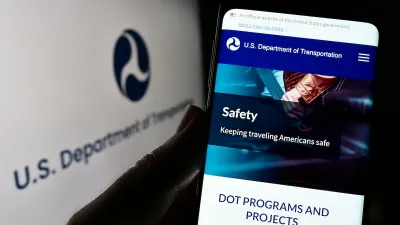The House Transportation and Infrastructure Committee moved to rescind funding for the Neighborhood Equity and Access program, which funds highway removals, freeway caps, transit projects, pedestrian infrastructure, and more.

The federal government could end all non-obligated funding for the Neighborhood Equity and Access program, amounting to over $3 billion in funds dedicated to highway removal and other infrastructure projects, reports Kea Wilson in Streetsblog USA. Yesterday, the House Transportation and Infrastructure Committee proposed the cuts, saying they would “reduce the deficit with recessions of wasteful Green New Deal style spending.”
Because projects funded by the initiative are massive long-term investments and the bulk of the funds have not been disbursed, as much as 94 percent of the program’s funding could be at risk, according to Transportation for America. “Meanwhile, a staggering 78 communities that were awarded those grants more than a year ago are still awaiting federal reimbursement, for which they would be left holding the bag if the cuts were to pass.”
The program, designed to complement the Reconnecting Communities initiative, received over 1,250 applications from communities across the country. That program could also be under threat, Wilson notes. “For now, some advocates say it's safe to assume that the open attack on the Neighborhood Access and Equity program signals that all federal money to reconnect communities is under threat — and it's time to call your representatives to ask them to defend projects in their districts.”
FULL STORY: Breaking: House Moves to Rescind $3.1B for Reconnecting Communities Divided by Highways

Planetizen Federal Action Tracker
A weekly monitor of how Trump’s orders and actions are impacting planners and planning in America.

Map: Where Senate Republicans Want to Sell Your Public Lands
For public land advocates, the Senate Republicans’ proposal to sell millions of acres of public land in the West is “the biggest fight of their careers.”

Restaurant Patios Were a Pandemic Win — Why Were They so Hard to Keep?
Social distancing requirements and changes in travel patterns prompted cities to pilot new uses for street and sidewalk space. Then it got complicated.

DC Area County Eliminates Bus Fares
Montgomery County joins a growing trend of making transit free.

Platform Pilsner: Vancouver Transit Agency Releases... a Beer?
TransLink will receive a portion of every sale of the four-pack.

Toronto Weighs Cheaper Transit, Parking Hikes for Major Events
Special event rates would take effect during large festivals, sports games and concerts to ‘discourage driving, manage congestion and free up space for transit.”
Urban Design for Planners 1: Software Tools
This six-course series explores essential urban design concepts using open source software and equips planners with the tools they need to participate fully in the urban design process.
Planning for Universal Design
Learn the tools for implementing Universal Design in planning regulations.
Heyer Gruel & Associates PA
JM Goldson LLC
Custer County Colorado
City of Camden Redevelopment Agency
City of Astoria
Transportation Research & Education Center (TREC) at Portland State University
Camden Redevelopment Agency
City of Claremont
Municipality of Princeton (NJ)





























